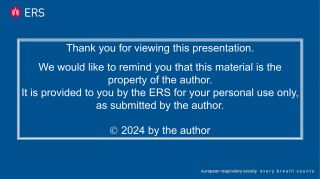8 October, 2024 | Online
18:00-19:00 CEST
Chairs: Prof. Dr Renato Cutrera (Rome, Italy), Dr Federica Porcaro (Rome, Italy)
Speakers: Prof. Anastassios Koumbourlis (Washington, United States), Dr Thomas Kovesi (Ottawa, Canada), Mrs. Danielle Carrier (Gatineau, Québec, Canada), Ms. Emma Squires (Gatineau, Québec, Canada)
Fees: Free for ERS members / €10 for non-members
Find out more about becoming a member
Overview
Tracheoesophageal fistula (TEF) is a rare congenital anomaly with long-term respiratory and gastrointestinal sequelae. The International Esophageal Atresia Association has now published care recommendations on the management of patients with TEF, and consensus guidelines on the transitioning of youth with TEF to medical care. This session will review these recommendations.
Educational aims
- Recognise the long-term respiratory complications of tracheoesophageal fistula (TEF)
- Describe the evaluation of TEF patients who have respiratory symptoms or deteriorating pulmonary function
- Identify appropriate respiratory monitoring of children and adults with a history of TEF
- Describe the components of a successful transition programme for youth with TEF
Topics
This webinar will focus on congenital anomalies, tracheomalacia, tracheoesophageal fistula, aspiration, gastroesophageal reflux, bronchiectasis, asthma, and pulmonary function. The presentations are as follows.
- Patient's and parent's perspective - Danielle Carrier, Emma Squires
- Evaluation of the patient with tracheoesophageal fistula with persistent symptoms or worsening respiratory status - Anastassios Koumbourlis
- New transition guidelines for TEF patients - Thomas Kovesi
Target audience
- Paediatric respirologists
- Adult respirologists
- Nurse practitioners
- Nurse coordinators
Learning outcomes
Following this webinar, participants will recognise how to:
- Monitor TEF patients
- Appropriately investigate a patient with TEF with recurrent infections, chronic cough or wheeze, or worsening lung function
- Step toward effective transitioning to adult medical care
CME credit
An application for accreditation of this webinar has been made to the European Board for Accreditation in Pneumology (EBAP) for 1 CME credit per 1-hour attendance. If accredited, the CME credit will be granted upon attendance of at least 60 minutes during the live webinar only.
What is a webinar?
A webinar closely simulates a lecture-based teaching experience. The speaker can interact with the audience, just as in a classroom setting. During the webinar, you will be asked to share your opinion on issues related to the topic using interactive polls.
All participants will be able to hear the lecturer and see the slides throughout the presentation. As a participant you will be able to pose questions or discuss ideas with the other participants via the text chat facility and the speaker will respond to the questions via the microphone.
Login guidelines
More information will be communicated in due course.
- Please log in to the webinar 20 minutes before it is scheduled to commence. If you have any technical difficulties whilst trying to log in or during the session please contact e-learning@ersnet.org.
- Check Central European Time.
- To achieve the best quality, we recommend to avoid downloading anything from the internet during your connection to the lecture and stopping all other programmes.
- Please also ensure that your audio settings are not set to mute and adjust the volume to a comfortable level.

